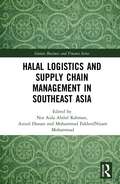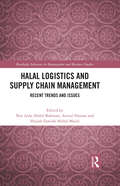- Table View
- List View
Haiti: The Tumultuous History—From Pearl of the Caribbean to Broken Nation
by Philippe GirardWhy has Haiti been plagued by so many woes? Why have multiple U.S. efforts to create a stable democracy in Haiti failed so spectacularly? Philippe Girard answers these and other questions, examining how colonialism and slavery have left a legacy of racial tension, both within Haiti and internationally; Haitians remain deeply suspicious of white foriegners' motives, many of whom doubt Hatians' ability to govern themselves. He also examines how Haiti's current political instability is merely a continuation of political strife that began during the War of Independence (1791-1804). Finally, Haiti: The Tumultuous History, Girard explores poverty's devastating impact on contemporary Haiti and argues that Haitians--particularly home-grown dictators--bear a big share of the responsibility for their nation's troubles.
Hala Madrid: Managing Real Madrid Club de Futbol, the Team of the Century
by F. Asis Martinez-Jerez Rosario M. De AlbornozFlorentino Perez, the president of Real Madrid, a leading European soccer team, is preparing for a press conference in which he will be asked about his plans for the coming season. Economic success and some sports mishaps during the prior season represent the scenario in which planning decisions are made.
Halal Business Management: A Guide to Achieving Halal Excellence
by Marco TiemanThe halal industry is a fast-growing industry due to demographics and industry expansion. Halal certification of products, outlets, and services is essential for doing business in Muslim-majority countries. This book shares the building blocks of professional halal business management, covering halal certification, halal supply chain management, branding and marketing, and halal risk and reputation management. Drawing on years of academic research and advisory experience, the book provides practical advice and guidance on how best to organise and upscale your halal business operations. Successful companies in the halal industry are those that embrace halal excellence by design. Halal excellence is a process – a pursuit of excellence. Halal business management is beyond halal certification, and needs to address supply chain management, branding and marketing, and risk and reputation management. Halal excellence needs measurement through adopting the right key performance indicators, to protecting your halal reputation and licence to operate in Muslim markets. This book gives proven, practical strategies to guide you in the halal industry. The book is for all organisations involved in serving Muslim markets, and also serves as a coursebook for graduate and postgraduate education in halal business management.
Halal Cryptocurrency Management
by Mohd Ma’Sum BillahThe growth of Islamic finance today is significant, making it timely to meet the market demand across the world and particularly for Muslim countries by producing a cryptocurrency model under the Shari’ah ethical principles. This book addresses core components of cryptocurrency within the Maqasid al-Shari’ah in enabling students, academics, users, traders, issuers, promoters, facilitators, managers, regulators, decision makers, blockchain technology providers, financial authorities, and other relevant professionals to understand Shari’ah cryptocurrency and its practical mechanisms. Among the issues covered are corporate understanding, global phenomena and world view, the Shari’ah model, SWOT analysis, innovation, conventional practices and the Halaldichotomy, regulatory standards, blockchain and its technological paradigm, practicality, establishment, and operational mechanisms, Zakat and Waqf through cryptocurrency, risk factors, and takaful solution. This book establishes a Halal alternative model of cryptocurrency management within the Maqasid al-Shari’ah to meet the contemporary global market demand.
Halal Development: Proceedings of the 1st International Conference on Halal Development (ICHaD 2020), Malang, Indonesia, October 8, 2020
by Heri PratiktoThe increasing demand for halal products, including goods and services, every year, especially for food and beverages, has resulted in a growing need for products with halal guarantees. Along with the increasing trend of the global demand, it has resulted in an increase in producers of halal food and beverages in both Muslim and non-Muslim countries. In addition the demand for halal tourism is also increasing. Indonesia is one of the largest Muslim countries in the world. However, there are still many Muslim consumer actors and Muslim producer actors who do not yet have an awareness of the importance of complying with the provisions of Islamic law in consuming and producing goods and services. There are still many restaurants and hotels that serve food and drinks that are not certified halal. There are still many food, medicinal and cosmetic products that are not halal certified. But now many secular countries such as France, Canada, Australia, the United States, Britain are also halal certified with the aim of meeting the Muslim demand for halal products for food and beverage, including for halal tourism. Starting from the development of the halal industry both in the fields of food, beverages and services, an International Seminar was held, which provides a more complete understanding of halal products, current halal developments and can serve as motivation to produce halal products, providing research results from the topic of halal development. The international seminar, entitled International Conference on Halal Development, listed speakers from several countries able to provide an overview of the halal development of several countries. This book contains a selection of papers from the conference.
Halal Investing for Beginners: How to Start, Grow and Scale Your Halal Investment Portfolio
by Ibrahim Khan Mohsin PatelAn intuitive and eye-opening guide to halal investing In Halal Investing for Beginners: How to Start, Grow and Scale Your Halal Investment Portfolio, a team of Oxford-educated Islamic finance gurus deliver a one-of-a-kind investing roadmap for Muslims who want to watch their savings grow while abiding by Islamic law. You’ll learn to distinguish between halal and haram investment products, get key strategies for saving on your taxes, learn to build a variety of portfolios, and more. In the book, the authors introduce and explain the wide variety of investment products available to investors who wish to restrict their financial activity to that which is consistent with Shariah law, including asset categories like equities, gold, art, start-ups, and even property. You’ll also find: Advice for every stage of life, including how to go halal for the first time, how to write an Islamic will, and how to build a halal pension Portfolio construction guidance for every risk tolerance, from high-growth to low risk Explanations of the important difference between “ethical” and “ESG” investment products and halal investmentsAn essential resource for Muslims who seek to invest while remaining true to their faith and values, Halal Investing for Beginners is the intuitive and easy-to-follow investment tutorial that everyday Muslims have been waiting for.
Halal Logistics and Supply Chain Management in Southeast Asia (Islamic Business and Finance Series)
by Nor Aida Abdul RahmanThe concept of Halal defines what adheres to Islamic law and is so comprehensive that it goes beyond food to include processes. The Halal industry has allowed many business firms a competitive advantage and is integral in its support for industries from food, tourism, banking and hospitality to medical. This book gives an overview of what Halal is in logistics and supply chain management, and discusses related issues and challenges in Southeast Asia. The book also examines Halal logistics and supply chain in reference to global trends and practices. It attempts to integrate theoretical and methodological aspects of Halal logistics and supply chain study in different geographical areas across industries. This will be a useful reference for those who wish to understand the Halal ecosystem and Halal logistics supply chain development.
Halal Logistics and Supply Chain Management: Recent Trends and Issues (Routledge Advances in Management and Business Studies)
by Rahman, Nor Aida AbdulThis book provides a comprehensive overview of Halal in logistics, supply chain management and the future implications for the Halal industry. It discusses a wide range of Halal logistics practices and theories in Japan, Korea, Spain, Oman, and SEA countries. The book examines technology applications, regulatory and certification procedure, Halal management system and quality control, sustainability and as well as challenges for the logistics and Halal supply chain in the pandemic context. The book also looks at how to navigate the complexity of the Halal logistics to achieve business sustainability. It uses a multidisciplinary approach to provide insights on the Halal logistics and supply chain study. This book hopes to fill an existing gap and enrich the literature on Halal logistics and supply chain management specifically in the West, Middle East and regions in Asia. This will be a useful reference to those who would like to learn more about this industry.
Halal Supply Chain Integrity: Concept, Constituents and Consequences
by Nor Aida Abdul Rahman Zawiah Abdul Majid Mohd Farid ShamsudinThe market and demand for halal goods and services is ever increasing, and, with it, the importance of supply chain integrity also increases. Integrity, from the perspective of halal logistics service providers, is a prerequisite of halal compliance. This book provides a unique overview of halal supply chain integrity (HSCI) using examples from Malaysia country as a case. The book carefully addresses and simplifies the issues of integrity in halal logistics and supply chain. It gathers findings from studies on halal supply chain integrity conducted in Malaysia, a leading country in halal production, to shed light on current issues, developments and future trends on the theory and practice of halal in the logistics sector. The book discusses factors such as halal quality assurance, trust and commitment and halal assets specificity, in particular. This book will be a useful reference to research scholars and professionals who wish to understand halal logistics and supply chain management and also the importance of protecting integrity of halal services and products.
Halbzeit der Energiewende?: An der Schwelle in eine neue Energiegesellschaft
by Josef GochermannIst die Energiewende steckengeblieben oder gar gescheitert? Haben Regulierung und Politik den Wandel zum nachhaltigen Umgang mit Energie ausgebremst? Verschläft die Wirtschaft die Wende? Nein, ganz und gar nicht. Während vielen die Energiewende nicht schnell genug vorankommt, befinden wir uns bereits auf der Schwelle in eine neue Energiegesellschaft. Die Energiewende ist Teil eines größeren Wandlungsprozesses. Ein Wandel im Umgang mit Energie, ihrer Gewinnung und ihres Wertes, Teil der laufenden vierten industriellen Revolution und viel mehr als nur der Umstieg auf regenerative Energien. Dieser Wandel vollzieht sich quer durch alle Bereiche der Wirtschaft und der Gesellschaft, baut die Energiewirtschaft um, verändert die Mobilität und initiiert dezentrale Lösungen in Unternehmen und Städten und Gemeinden. Das Buch richtet sich an alle, die sich am Umbau des Energiesystems beteiligen wollen, Unternehmen und Organisationen sowie auch der Politik.
Hale and Dorr (A)
by David B. GodesHighlights how word-of-mouth is crucial in the acquisition of new customers. Specifically, it shows the existence of both internal (to the firm) and external markets for customer leads.
Half-Earth Socialism: A Plan to Save the Future from Extinction, Climate Change and Pandemics
by Troy Vettese Drew PendergrassA plan to save the earth and bring the good life to all In this thrilling and capacious book, Troy Vettese and Drew Pendergrass challenge the inertia of capitalism and the left alike and propose a radical plan to address climate disaster and guarantee the good life for all. Consumption in the Global North can&’t continue unabated, and we must give up the idea that humans can fully control the Earth through technological &“fixes&” which only wreak further havoc. Rather than allow the forces of the free market to destroy the planet, we must strive for a post-capitalist society able to guarantee the good life the entire planet. This plan, which they call Half-Earth Socialism, means we must: • rewild half the Earth to absorb carbon emissions and restore biodiversity • pursue a rapid transition to renewable energy, paired with drastic cuts in consumption by the world&’s wealthiest populations • enact global veganism to cut down on energy and land use • inaugurate worldwide socialist planning to efficiently and equitably manage production • welcome the participation of everyone—even you! Accompanied by a climate-modelling website inviting readers to design their own &“half earth,&” Vettese and Pendergrass offer us a visionary way forward—and our only hope for a future.
Halftime for Heidelberg
by Debora L. SparThe case follows President Rob Huntington as he seeks to find a viable way forward for Heidelberg University. Located in Tiffin, Ohio, Heidelberg is a small, private, four-year university. As with many similar institutions of higher education, it currently faces a daunting and mounting set of challenges, most of which stem from financial and demographic changes that are far beyond its control. During Huntington's eleven-year tenure, the university has experimented with a number of efforts aimed at attracting and retaining students. But in 2019, with enrollment, retention, and graduation rates stagnating and the university once again running a deficit, Huntington must consider more drastic measures. What can he do to underscore the "Heidelberg difference" and ensure that the university survives?
Halliburton's Army: How a Well-connected Texas Oil Company Revolutionized the Way America Makes War
by Pratap ChatterjeeHalliburton's Army is the first book to show, in shocking detail, how Halliburton really does business, in Iraq, and around the world. From its vital role as the logistical backbone of the U. S. occupation in Iraq--without Halliburton there could be no war or occupation--to its role in covering up gang-rape amongst its personnel in Baghdad, Halliburton's Army is a devastating bestiary of corporate malfeasance and political cronyism. Pratap Chatterjee--one of the world's leading authorities on corporate crime, fraud, and corruption--shows how Halliburton won and then lost its contracts in Iraq, what Dick Cheney and Donald Rumsfeld did for it, and who the company paid off in the U. S. Congress. He brings us inside the Pentagon meetings, where Cheney and Rumsfeld made the decision to send Halliburton to Iraq--as well as many other hot-spots, including Somalia, Yugoslavia, Uzbekistan, Afghanistan, Guantánamo Bay, and, most recently, New Orleans. He travels to Dubai, where Halliburton has recently moved its headquarters, and exposes the company's freewheeling ways: executives leading the high life, bribes, graft, skimming, offshore subsidiaries, and the whole arsenal of fraud. Finally, Chatterjee reveals the human costs of the privatization of American military affairs, which is sustained almost entirely by low-paid unskilled Third World workers who work in incredibly dangerous conditions without any labor protection. Halliburton's Army is a hair-raising exposé of one of the world's most lethal corporations, essential reading for anyone concerned about the nexus of private companies, government, and war.
Halliday's OASIS
by Scott Duke Kominers Nicole Tempest KellerWade Watts has won control of the OASIS - a futuristic, immersive virtual reality game world. He must decide on rules, rights, and marketplace design, balancing the founding principles of the OASIS with the platform's potentially negative externalities.
Halloran Metals
by Roy D. ShapiroTwo competitors in the Northeast steel service center industry have made very different choices with regards to logistics and operating strategy. One distributes from a large central location; the other operates seven widely scattered warehouses. Students can diagnose and discuss the significant impacts of these choices, especially in an economic downturn.
Hallstead Jewelers
by William J. Bruns Jr.A retail jeweler has relocated to a larger store and is experiencing losses for the first time. Sales and costs have increased along with the breakeven point. Changes in pricing and promotion must be explored. Alternative actions to return to profitability can be considered.
Halophyte Plant Diversity and Public Health
by Mushtaq Ahmad Muhammad Zafar Münir Öztürk Volkan Altay Moona NazishSalinity is one of the acute problems causing enormous yield loss in many regions of the world. This phenomenon is particularly pronounced in arid and semiarid regions. Halophytes can remove salt from various types of problematic soils due to their unique morphological, physiological and anatomical adaptations to these environments. Halophytes are also used for the treatment of certain diseases but scientific documentation in terms of current phytotherapic applications is deficient in this unique group of plants. Different ethnic groups around the world use medicinal halophytes according to their own beliefs and ancestor’s experiences. However, their knowledge about the use of salt tolerant medicinal plants is usually confined to their own community. There is thus a knowledge gap on halophytes which should be bridged and preserved. This book provides a comprehensive account on the distribution of halophytes, their ethnobotanical and medicinal aspects, economic importance, and chemical constituents along with scientific description. The book therefore serves as a valuable resource for professionals and researchers working in the fields of plant stress biology and ethnobotanical aspects.
Haltung: Warum die Wirtschaft mehr davon braucht – und die Architektur sie schon hat
by Alexander GutzmerSie ist zu einer Art Fetisch unserer Wirtschaftsdebatten geworden – die „Haltung“. Kaum ein großes CEO-Interview, in dem nicht irgendwann die Frage nach seiner oder Ihrer Haltung beziehungsweise der seines oder ihres Unternehmens zu diesem oder jenem großen gesellschaftlichen Thema auftaucht. In der Regel haben die Chefs auch ein einigermaßen brauchbares Arsenal an PR-tauglichen Floskeln parat. Aber das reicht nicht. Den enttäuschten Interviewern nicht. Und uns als Bürgern erst recht nicht. Und dennoch – wir wollen, dass unsere Vorstandschefs Haltung zeigen. Wir wollen, dass unsere Unternehmen erkennbar Position beziehen – und zwar gerade auch dann, wenn es weh tut. Genau das aber tun sie nicht. Wie auch? Keiner hat ihnen ja gesagt, wie Haltung beziehen geht. Oder woran man sich orientiert, wenn man eine Haltung explizit machen und mit konkreten Handlungsmustern verknüpfen will. Dieses Buch leistet dies. Es sucht nach einem gesellschaftlichen Teilbereich, der in der Entwicklung und Einforderung von Haltung Erfahrung hat. Und findet ihn – in der Architektur. Architekten sind es gewohnt, Haltungen zu entwickeln. Im Studium fordern Professoren diese ein, später die Bevölkerung. Was leisten Eure Gebäude, warum wollt Ihr, dass unsere Städte so aussehen, wie Ihr sie Euch vorstellt? Architekten sind, wenn sie ihrem Handwerk auf überzeugende Weise nachkommen, Haltungsmeister. Von ihnen kann man lernen, wie „Haltung“ geht. Um diese Lernprozesse - dargestellt am Beispiel der Architektur/ prägender Architekten - zu initiieren, schreibt Alexander Gutzmer, Chefredakteur der Architekturzeitschrift Baumeister und Professor für Medien und Kommunikation an der Berliner Quadriga-Hochschule, dieses Buch.
Hamburger America: Completely Revised and Updated Edition
by George MotzAmerica's hamburger expert George Motz returns with a completely updated edition of Hamburger America, now with 150 establishments where readers can find the best burgers in the country. George Motz has made it his personal mission to preserve America's hamburger heritage, and his travelogue spotlights the nation's best roadside stands, nostalgic diners, mom-n-pop shops, and college town favorites--all with George's photographs and commentary throughout. Whether you're an armchair traveler, a serious connoisseur, or curious adventurer, Hamburger America is an essential resource for reclaiming this precious slice of Americana.
Hamburgers in Paradise: The Stories Behind the Food We Eat
by Louise O. FrescoA fascinating exploration of our past, present, and future relationship with foodFor the first time in human history, there is food in abundance throughout the world. More people than ever before are now freed of the struggle for daily survival, yet few of us are aware of how food lands on our plates. Behind every meal you eat, there is a story. Hamburgers in Paradise explains how.In this wise and passionate book, Louise Fresco takes readers on an enticing cultural journey to show how science has enabled us to overcome past scarcities—and why we have every reason to be optimistic about the future. Using hamburgers in the Garden of Eden as a metaphor for the confusion surrounding food today, she looks at everything from the dominance of supermarkets and the decrease of biodiversity to organic foods and GMOs. She casts doubt on many popular claims about sustainability, and takes issue with naïve rejections of globalization and the idealization of "true and honest" food. Fresco explores topics such as agriculture in human history, poverty and development, and surplus and obesity. She provides insightful discussions of basic foods such as bread, fish, and meat, and intertwines them with social topics like slow food and other gastronomy movements, the fear of technology and risk, food and climate change, the agricultural landscape, urban food systems, and food in art.The culmination of decades of research, Hamburgers in Paradise provides valuable insights into how our food is produced, how it is consumed, and how we can use the lessons of the past to design food systems to feed all humankind in the future.
Hamilton Real Estate: Confidential Role Information for the CEO of Estate One (BUYER)
by Deepak MalhotraPresents a two-party negotiation between the executive VP of Pearl Investments and the CEO of Estate One for the sale of real estate in the town of Hamilton.
Hamilton Real Estate: Confidential Role Information for the Executive VP of Pearl Investments (SELLER)
by Deepak MalhotraPresents a two-party negotiation between the executive VP of Pearl Investments and the CEO of Estate One for the sale of real estate in the town of Hamilton.
Hamilton's Curse: How Jefferson's Arch Enemy Betrayed the American Revolution and What It Means for Americans Today
by Thomas J. DilorenzoTwo of the most influential figures in American history. Two opposing political philosophies. Two radically different visions for America. Thomas Jefferson and Alexander Hamilton were without question two of the most important Founding Fathers. They were also the fiercest of rivals. Of these two political titans, it is Jefferson---the revered author of the Declaration of Independence and our third president---who is better remembered today. But in fact it is Hamilton's political legacy that has triumphed---a legacy that has subverted the Constitution and transformed the federal government into the very leviathan state that our forefathers fought against in the American Revolution. How did we go from the Jeffersonian ideal of limited government to the bloated imperialist system of Hamilton's design? Acclaimed economic historian Thomas J. DiLorenzo provides the troubling answer in Hamilton's Curse. DiLorenzo reveals how Hamilton, first as a delegate to the Constitutional Convention and later as the nation's first and most influential treasury secretary, masterfully promoted an agenda of nationalist glory and interventionist economics---core beliefs that did not die with Hamilton in his fatal duel with Aaron Burr. Carried on through his political heirs, the Hamiltonian legacy: * Wrested control into the hands of the federal government by inventing the myth of the Constitution's "implied powers" * Established the imperial presidency (Hamilton himself proposed a permanent president---in other words, a king) * Devised a national banking system that imposes boom-and-bust cycles on the American economy * Saddled Americans with a massive national debt and oppressive taxation * Inflated the role of the federal courts in order to eviscerate individual liberties and state sovereignty * Pushed economic policies that lined the pockets of the wealthy and created a government system built on graft, spoils, and patronage * Transformed state governments from Jeffersonian bulwarks of liberty to beggars for federal crumbs By debunking the Hamiltonian myths perpetuated in recent admiring biographies, DiLorenzo exposes an uncomfortable truth: The American people are no longer the masters of their government but its servants. Only by restoring a system based on Jeffersonian ideals can Hamilton's curse be lifted, at last.
Hamilton's Industrial Heritage
by Richard N. PilandHamilton has been an important activity center in Butler County since its founding in 1791, as its proximity to the Great Miami River made it an ideal county seat and agricultural hub. Beginning in 1845, the Hamilton Hydraulic Company diverted the river's flow through town and developed a system that supplied cheap waterpower to area mills. By 1900, Hamilton was "the greatest manufacturing city of its size in the world," and by the 1940s it was home to several of the world's largest industries. Champion Paper milled coated paper, Niles Tool Works manufactured machine tools, Hooven-Owens-Rentschler built Corliss engines, Estate Stove made stoves, and Mosler and Herring-Hall-Marvin Safe Companies earned Hamilton its reputation as the "Safe Capital of the World." More than 150 factories and shops developed diverse product lists in the early 1900s, but only three of these businesses still operate in Hamilton today.

















